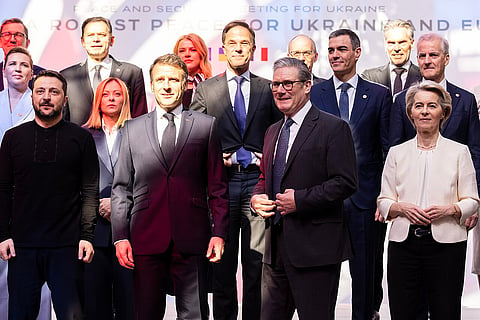

Defense ministers from 30 countries, part of a Franco-British-led coalition, will gather at NATO headquarters on Thursday to discuss military support for Ukraine in the event of a peace deal with Russia. Notably absent from the talks will be the United States, raising concerns about Washington’s long-term commitment to European security efforts.
The meeting, convened by France and the UK, aims to coordinate a multinational "reassurance force" intended to deter future Russian aggression against Ukraine. The discussions follow a recent visit by French and British military officials to KIev, where they met with Ukrainian President Volodymyr Zelenskyy and Defense Minister Rustem Umerov to assess strategic needs.
A Coalition Without Full Consensus
UK Defense Secretary John Healey is expected to emphasize the urgency of bolstering Ukraine’s defenses, stating: “We cannot jeopardize the peace by forgetting about the war. We must increase pressure on Putin and enhance our support for Ukraine—both in today’s fight and in securing lasting peace.”
French President Emmanuel Macron, who hosted a summit on the issue last month, has suggested that the force could be deployed in key Ukrainian locations. However, not all coalition members have committed to sending troops. Poland and Greece, for instance, cited security concerns with Belarus and Turkey, respectively, as reasons for their reluctance.
Another major point of contention is the absence of U.S. involvement. Many coalition members view American air defense and intelligence support as critical, but the Trump administration has so far declined to participate. Both Macron and UK Prime Minister Keir Starmer have maintained contact with President Donald Trump in hopes of securing U.S. backing, but Washington remains hesitant.
U.S. Retreat from European Defense Leadership
The U.S. has also distanced itself from the Ukraine Defense Contact Group—also known as the Ramstein Group—which it previously chaired under the Biden administration. Defense Secretary Pete Hegseth is not expected to attend the group’s next meeting on Friday, fueling speculation about a broader shift in U.S. strategic priorities.
European officials have expressed unease over the Trump administration’s perceived dismissiveness toward NATO. Reports of potential U.S. troop reductions in Europe—ranging from 10,000 to 50,000 personnel—have further unsettled allies. While NATO Secretary General Mark Rutte has downplayed such concerns, calling them premature, diplomats privately worry about a unilateral U.S. withdrawal.
Growing Uncertainty Over NATO’s Future
Adding to the tension are unconfirmed reports that the U.S. may reconsider its traditional role as NATO’s Supreme Allied Commander Europe (SACEUR), a position always held by an American general. Though no immediate changes are expected, the mere suggestion has sparked alarm in Brussels.
U.S. Secretary of State Marco Rubio has dismissed fears of a NATO retreat as "hyperbole," insisting that American commitment remains strong. Yet skepticism persists, particularly after Defense Secretary Hegseth remarked earlier this year that European allies should not assume indefinite U.S. military presence on the continent.
As discussions continue, European leaders are racing to solidify a unified strategy—one that ensures Ukraine’s security with or without full U.S. involvement. For now, the empty chair at Thursday’s meeting serves as a stark reminder of the transatlantic alliance’s uncertain future.